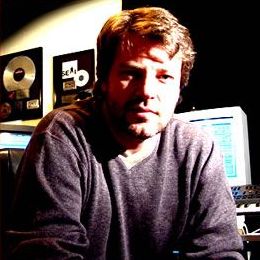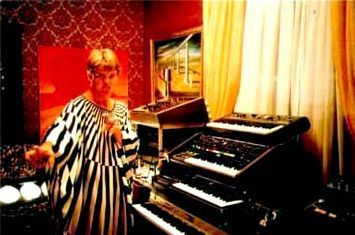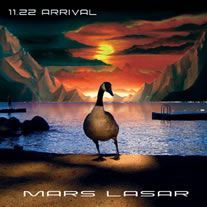Participants of interview:
SR – Specialradio press-attache, Maria Anikeeva
Mars – Mars Lasar
——————————-

SR: You’ve been involved into music since your childhood. Who decided to make you a musician?
Mars: I started playing the piano when I was 11 years old. I was inspired by a lady who played the piano every Sunday morning, she played many old songs that I became very familiar with. I asked her to teach me and that’s how it started. Shortly after I had professional piano tuition and I became involved in electronic music. I combined my classical training and curiosity for electronic music together and came up with something I thought was worth exploring. Which then became my career… Who knew??
SR: What was that something special that is still remembered during your collaboration with Mike Oldfield and Midnight oil?
Mars: When my band “IQ” a synthesizer band collaborated with Mike Oldfield I met the one person who changed my destiny. This was Kim Ryrie, founder of the first computer music production company “Fairlight Instruments”. Kim saw me perform with Mike Oldfield and asked me and my partner in the band “Ken Davis” to come and join his team to develop the first computer music sequencer. I worked for Fairlight for eight years, developing the technology, making the first computer music sample library, composing demonstration songs that shipped with the computer and traveling the world performing and composing at various tradeshows and personal demonstrations for artists and music producers like Alan Parsons, Duran Duran, Kate Bush, popular artists at the time. The only thing I remember about playing in my band before Midnight Oil is them pulling out the plug because we where getting too much attention!
SR: Tell us more about your collaboration with Trevor Horn for the Seal’s album. Were there any other suggestions or invitations to co-work with him? Have you met with Seal again after the recording?
Mars: I worked on Seals “Crazy” and “Killer” from his first album. I was asked to play keyboards and program drums, bass, special fx on the master recording. There were many musicians involved, and Trevor assigned each one of us to do different tasks.
SR: What is more important for you – working as a band or solo projects?
Mars: Both are very satisfying. They just have very different ways of coming to the same outcome.

SR: Are you producing anything besides your own albums? What musicians are you going to collaborate with?
Mars: Right now I’m working on my future albums, I plan to have many released over the next ten years.
SR: How different is the American music business from the one in Europe or Asia?
Mars: I live in California USA. The rules in music market for each territory are considerably different but the core is essentially the same. Producing music and getting it to the customers. Everything has changes since the digital age, and now we can access the global market on our computers buy anything we want. So music distribution is changing rapidly, even though some may disagree, I think it’s for the good.
SR: It’s interesting to get behind the story of your collaborationg with Tatu. You really think they’re professional and expressive artists? In Russia there’re completely different opinions on this topic.
Mars: When the girls from Tatu first came into my studio I found them to be very energetic, professional and talented. I enjoyed working with them, it was fresh and exciting.
SR: For you working for TV is another major part of your job. What is the main difficulty in a process of making music for TV and what is the easiest part of it?
Mars: Writing music for TV requires that you follow a “brief”. This means you may not compose outside what the brief entails. For example, if you’re asked to compose music for a thriller, it would be very different to composing for a love story. So the difficulty is just knowing what you’re composing for and the current specifications.
SR: Tell us about the technologies you’ve used in “11.22” Arrival recording.
Mars: 11.22 was recorded virtually, meaning there was no tape or external mixer involved, it was all done in the computer using a program called “Logic Pro”. I’m very happy with the end result. Virtual recording gives you so much more flexibility than traditional recording.

SR: What would you like to wish to those who’s eager to become musicians?
Mars: Embrace the technology, read the manuals, compose long hours, study the music business in detail (including music publishing) and do not be afraid to stand up and when you’ve been rejected. Knowing your value as a composer comes from your hard work and devotion to the skill. The rest is icing on the cake!
January 2006
————————–
Official site: www.marslasar.com
Photo from: www.marslasar.com
Biography and photos (on russian): http://specialradio.ru/i/mars_lasar/
Leave a Reply